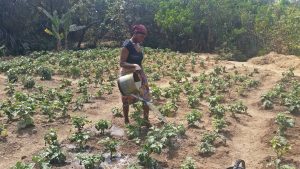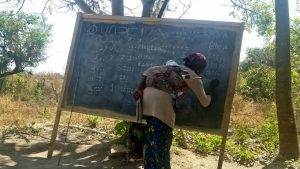This project is made possible through the partnership of WATER CHARITY and the NATIONAL PEACE CORPS ASSOCIATION. ![]()
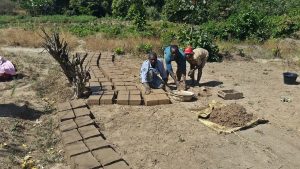 Location
Location
This project summary has been redacted for security reasons.
Pita Prefecture, Guinea
Community Description
The communities of Mboukeya, Hafia, and Bouroure Feto are located in the Fouta Djallon highlands in central northern Guinea. The population of the 3 villages combined is approximately 1,400 people. The main economic activities in the area are farming, herding, blacksmithing, fabric dying and tailoring.
With the help of a local farmer, a group of farmers in the area came together in 2013 and organized themselves into three gardening cooperatives. They started with a smaller space but when they saw that it was going well they moved to a bigger space offered by one of the members. The 3 cooperatives farm together in a 2-hectare area.
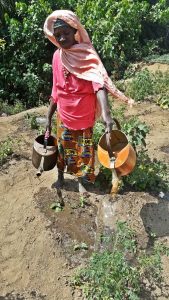 The cooperative members pool their money to buy inputs such as seed, fertilizer and tools. They also work together to collect wood to fence the area so that animals such as cows, sheep and goats cannot get in. Depending on the season, they farm potatoes, peanuts, beans, eggplants, tomato, cabbage, onions, peppers, and watermelon. Produce is then sold in Pita, a larger town about 10 km away.
The cooperative members pool their money to buy inputs such as seed, fertilizer and tools. They also work together to collect wood to fence the area so that animals such as cows, sheep and goats cannot get in. Depending on the season, they farm potatoes, peanuts, beans, eggplants, tomato, cabbage, onions, peppers, and watermelon. Produce is then sold in Pita, a larger town about 10 km away.
The land is divided up into plots with 1 or 2 farmers assigned to a plot. Each cooperative consists of 20 members. Out of the 60 members, 44 are women.
Problem Addressed
The land used by the 3 cooperatives is located next to a river, but lack of advanced equipment for irrigation means that during the dry season the land they can farm is confined to what is next to the river.
The area is currently watered using watering cans. While the entire area is a little over 2 hectares, they can only farm about three-fourths of a hectare, less than half the space, during the 6-month dry season.
Project Description
This project is to build a water basin and install a motor pump to allow for water from the river to be used for irrigation of the cooperative land.
As the area is on a slope, the basin will be built at the top allowing for improvements in the following years in the form of canals to further ease watering. For now, the area will be watered using hoses attached to the basin.
The cooperatives will provide all materials needed to build the basin (sand, gravel, cement, bricks) and they will be in charge of all aspects of basin construction.
Members of the cooperatives will be trained to maintain the irrigation system. The training will consist of general cooperative management, management of funds for the motor pump, motor pump maintenance, and basic bookkeeping.
Two well-respected people from the community will help with this training. One works in the Agriculture department at the local government level and received training on cooperative finances while working with the U.N. Food and Agriculture Organization (FAO). He will be helping the cooperatives to establish rules and procedures regarding the motor pump fund. They will need to establish rules to guide them in terms of a) contributing to fuel, b) contributing to parts and c) contributing to the cost of repairs. The other community member is a local farmer who works with cooperatives in the area and has experience working with motor pumps. He will provide training for 1 or 2 people on motor pump maintenance.
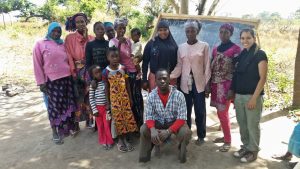 The PCV has already started working with a select group of women (4 women in leadership roles from each cooperative) to train them in literacy and basic bookkeeping. The majority of the women in these groups cannot read or write which makes it hard to do any sort of accounting. Armed with these skills the cooperatives will be able to effectively manage funds needed for motor pump fuel and maintenance as well as other cooperative expenses.
The PCV has already started working with a select group of women (4 women in leadership roles from each cooperative) to train them in literacy and basic bookkeeping. The majority of the women in these groups cannot read or write which makes it hard to do any sort of accounting. Armed with these skills the cooperatives will be able to effectively manage funds needed for motor pump fuel and maintenance as well as other cooperative expenses.
Project Impact
This project will benefit 300 people, consisting of 60 cooperative members and their families.
Peace Corps Volunteer Directing Project
M. Quezada
Monitoring and Maintenance
To ensure sustainability, the PCV and workshop trainers will work closely with the cooperatives to establish rules and procedures for the motor pump fund. A small amount will be collected from each person to be used for fuel, maintenance, and repair.
A set of spare hoses will be provided to replace those that are no longer serviceable.
This project has been fully funded through the generosity of an anonymous donor.
